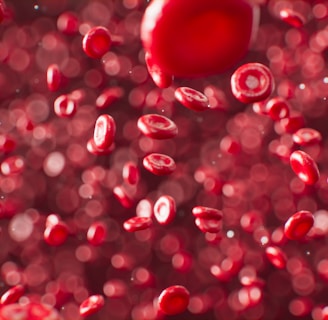Signs you might be anemic
E.C | Pharmacist
12/30/20232 min read


Here are some signs you might be anaemic:
Fatigue and Weakness:
Anaemia can lead to a decreased supply of oxygen to your muscles and tissues, causing fatigue and a general feeling of weakness.
Pale or Yellowish Skin:
A lack of red blood cells may result in paleness, particularly noticeable in the face, inside the lower eyelids, and on the palms of the hands.
Shortness of Breath:
Insufficient oxygen supply may lead to difficulty breathing, especially during physical activity.
Heart Palpitations:
Anaemia can cause your heart to work harder to pump oxygen-rich blood throughout your body, resulting in an increased heart rate or palpitations.
Dizziness or Lightheadedness:
Reduced oxygen flow to the brain can lead to dizziness, lightheadedness, or a feeling of being faint.
Cold Hands and Feet:
Poor circulation due to a decreased number of red blood cells can result in cold extremities.
Headache:
Insufficient oxygen reaching the brain may cause headaches, which can be a symptom of anaemia.
Brittle Nails and Pale Nail Beds:
Anaemia may affect the health of your nails, making them brittle or causing the nail beds to appear pale.
Craving Non-Nutritive Substances (Pica):
In some cases, individuals with anaemia may develop unusual cravings for non-food items like ice, clay, or paper.
Irregular Heartbeat:
Severe anaemia can lead to an irregular heartbeat or heart murmurs.
Cognitive Issues:
Insufficient oxygen to the brain may affect cognitive function, leading to difficulties in concentration and memory.
Soreness of the Tongue and Mouth:
Anaemia may cause changes in the texture of the tongue and mouth, leading to soreness or inflammation.
If you're experiencing several of these symptoms or suspect you may be anaemic, it's important to seek advice from a healthcare professional. They can perform blood tests to determine your haemoglobin levels and identify the underlying cause of your symptoms. Anaemia is a treatable condition, and the appropriate intervention can help improve your overall health and well-being.
Anaemia occurs when your body lacks enough red blood cells or haemoglobin, leading to a reduced ability to carry oxygen to your body's tissues. While anaemia can have various causes, some common signs and symptoms can help you identify whether you might be experiencing this condition. Keep in mind that the following signs may also be indicative of other health issues, so it's crucial to consult with a healthcare professional for an accurate diagnosis.
TheRemotePharmacist Ltd © 2022
The Remote Pharmacist is an online platform created by a pharmacist that aims in delivering updated and trustworthy information and advice on anything related to pharmacy and healthcare.
Reframe your inbox
Subscribe to our newsletter and never miss an article.
We care about your data in our privacy policy.
